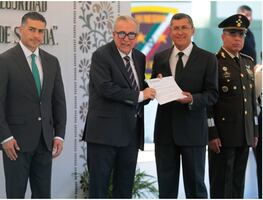Más Información

Videojuegos, el nuevo gancho del crimen para captar menores; los atraen con promesas de dinero y poder

“Vamos a dar apoyo a los pequeños agricultores por sequía en Sonora”; Claudia Sheinbaum instruye a Berdegué

Derrota de México en disputa por maíz transgénico contra EU; estos son los argumentos de Sheinbaum y AMLO para prohibirlo
The ashes of Nobel Prize-winning novelist Gabriel García Márquez have been laid to rest in the historic Caribbean port city of Cartagena, Colombia, where he began his writing career.
On Sunday, members of García Márquez's family were joined by friends and local dignitaries in dedicating a bronze bust of the author, sculpted by British artist Katie Murray, in the colonial-era Cloister of La Merced.
The bust sits atop a commemorative stone holding part of García Márquez's ashes. The rest of the ashes will remain in Mexico, where he lived for decades and died in 2014.
The president of the University of Cartagena, Edgar Parra Chacón, reminded everybody of the time when the young writer had to interrupt his law studies in Bogotá because of what came to be known as "El Bogotazo," caused by the murder of liberal leader Jorge Eliécer Gaitán. García Márquez then moved to Cartagena and entered the university.
He abandoned all intentions of becoming a lawyer a while later, but his name became a part of the history of the local university and the city, according to the governor of the state of Bolívar, Dumek Turbay.
"Welcome home Gabo, Gabriel, Gabito. Here with us forever after," Turbay expressed.
"Gabo's ashes, requested by many in the whole world, will rest in this place," expressed Parra Chacón to García Márquez's widow, Mercedes Barcha, and their children Gonzalo and Rodrigo. "It is an honor to receive the ashes of our immortal Nobel laureate," he added.
One of García Márquez grandchildren, Mateo García Márquez, read a fragment of "Live to Tell," his memoirs, about Gabo's arrival to Cartagena.
The ceremony was closed with vallenato music, his favorite, by Adolfo Pacheco and Julio Rojas, with a rain of yellow papers falling over the audience.







